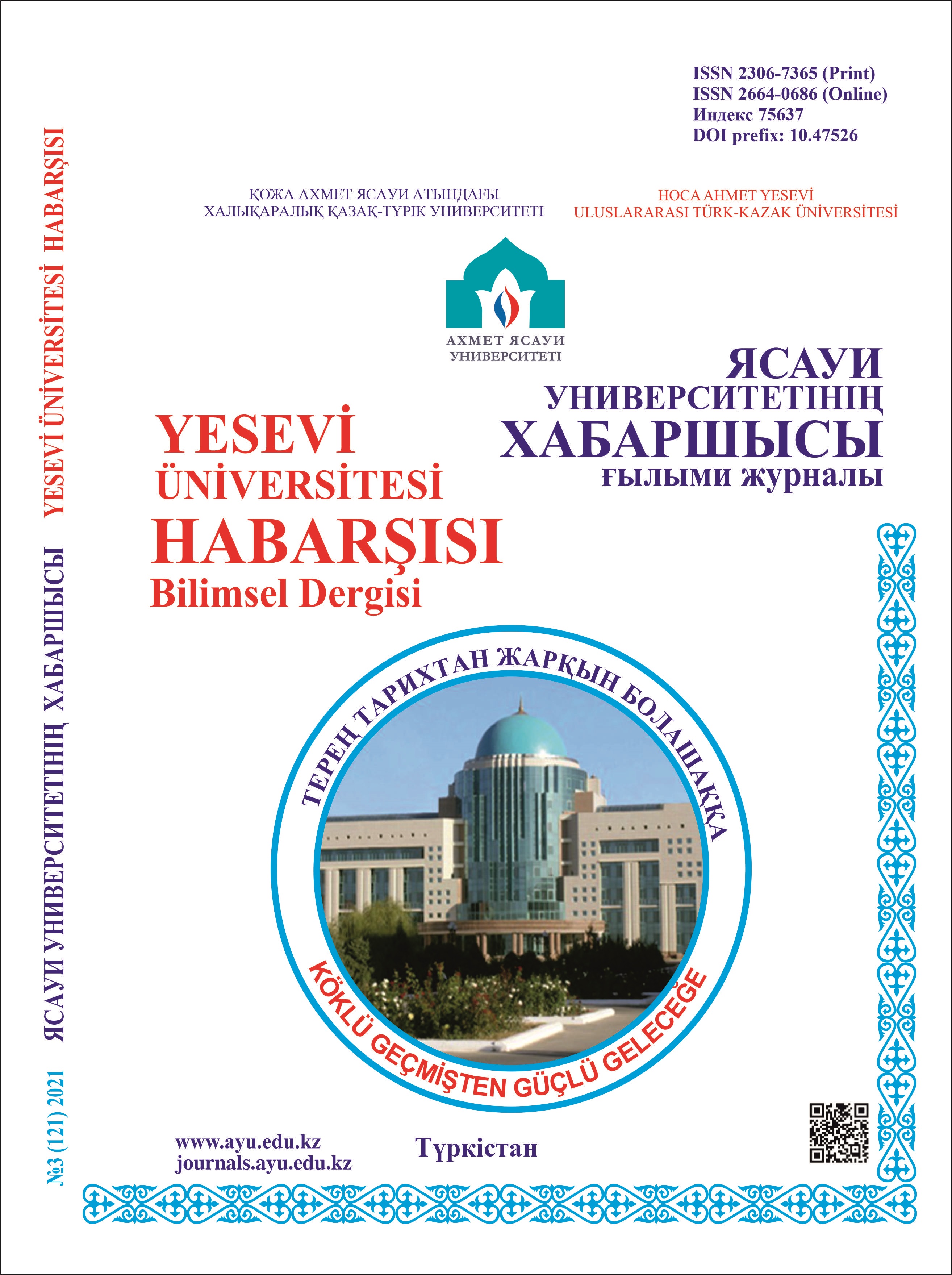The Effectiveness of Using Mnemonic Methods in Teaching the Kazakh Language
183 171
Keywords:
memory, memorization, mnemonics, methods, field, effectiveness.Abstract
The problem of teaching the Kazakh language in our country is one of the most urgent. This direction currently requires optimization, systematization of this area, updating the methodology, increasing the number of experienced specialists and high-quality training content. Of course, it cannot be said that there is neither development nor change. There is development, and change, and result, but slower, with less result. The specialists who teach the Kazakh language also hone their experience and prepare educational content. It is known that this process is being carried out in the republic, starting from kindergartens and ending with schools, colleges, universities, language learning centers and private centers that teach the Kazakh language daily. Every citizen who teaches and studies the Kazakh language directly contributes to the expansion of the scope of the state language, improving the status of our language. Now it is very important that the methodology and training content that ensure the quality of these processes are constantly improved and updated in accordance with the rapid changes of time. To do this, every specialist of the Kazakh language should constantly look for scientific and methodological orientation, be able not only to master new technologies, but also to use them rationally in the classroom.
In language teaching, it is very important that the teacher achieve a true result, i.e. be able to formulate the skills and abilities of the audience to speak Kazakh, write, read, listen and understand. The proposed article discusses various ways to achieve results in teaching the Kazakh language. The authors gave a scientific and theoretical description of mnemonic techniques that allow you to correctly memorize lexical and grammatical material, and suggested ways to use it effectively in language lessons. It is noted that the frequent use of these methods as an innovative technique in linguistics lessons makes it possible to improve the methodology and hone language experience.
References
Harley T. The Psychology of Language: From Data to Theory. Chapter 6: Recognize visual words. – London: Routledge, 2013. – P. 152–168.
Atkinson R. Mind and Behavior: Introduction to Psychology, 1993. – 256 p.
Гольдин В.Е. Языковое сознание. Речевая коммуникация: избранные работы / сост. О.Ю. Крюкова, А.П. Сдобнова. – Саратов: Изд-во Саратовского университета, 2020. – 496 с.
Қадашева Қ., Омарова С.Қ., Асанова У.О., Амиржанова А.О. Ассоциативтік өріс жəне ортақ сөздер оқу сөздігі, А1-А2 деңгейлері (туыс тіл ретінде оқыту): Оқу-əдістемелік кешен. – Түркістан: Тұран, 2022. – 149 б.
Егорова Т.В. Словарь иностранных слов русского языка. – М.: Аделант, 2014. – 800 с.
Эренберг О. Приёмы запоминания информации. [Электронный ресурс]. URL: http://www.toptrening.ru/articles/1052/ (дата обращения 03.07.2017).
Ушаков Д.Н. Толковый словарь русского языка. Т. 2. – М.: Государственное издательство иностранных и национальных словарей, 1938. – 526 с.
Раушанова А.Ж. Методологические подходы к изучению влияния тренировки рабочей памяти на качество образования обучающихся: дисс. ... док. филос. (PhD). – Алматы, 2015. – 113 с.
Коротаева И.В. Использование приема систематизации текста у старшеклассников и студентов: дис. ... канд. псих. наук. – Москва, 2000. – 180 с.
Ибрагимов Р., Калимбетов Б., Хабибуллаев Ж. Болашақ математика мұғалімдерін логикалық тапсырмаларды орындауға даярлау ерекшеліктері // Ясауи университетінің хабаршысы. – 2023. – №3 (129). – Б. 239–252.
Yap M.J., Balota D.A. Visual word recognition. In Oxford Handbook of Reading / Edited by A. Pollatsek, R. Treiman. – New York: Oxford Univ. Press, 2015. – P. 26–43.
REFERENCES
Harley T. The Psychology of Language: From Data to Theory. Chapter 6: Recognize visual words. – London: Routledge, 2013. – P. 152–168.
Atkinson R. Mind and Behavior: Introduction to Psychology, 1993. – 256 p.
Goldin V.E. Iаzykovoe soznanie. Rechevaia kommunikacia: izbrannye raboty [Language consciousness. Speech communication: selected works] / sost. O.Iu. Kriukova, A.P. Sdobnova. – Saratov: Izd-vo Saratovskogo universiteta, 2020. – 496 s. [in Russian]
Qadasheva Q., Omarova S.Q., Asanova U.O., Amirjanova A.O. Asosiativtık oris jane ortaq sozder oqu sozdigi, A1-A2 dengeileri (tuys til retinde oqytu) [Associative field and common words educational dictionary, levels A1-A2 (teaching as a related language)]: Oqu-adistemelik keshen. – Turkistan: Turan, 2022. – 149 b. [in Kazakh]
Egorova T.V. Slovar inostrannyh slov russkogo iazyka [Dictionary of foreign words of the Russian language]. – M.: Adelant, 2014. – 800 s. [in Russian]
Erenberg O. Priiomy zapominania informacii [Techniques for memorizing information]. [Electronic resource]. URL: http://www.toptrening.ru/articles/1052/ (date of access 03.07.2017). [in Russian]
Ushakov D.N. Tolkovyi slovar russkogo iazyka [Explanatory dictionary of the Russian language]. T. 2. – M.: Gosudarstvennoe izdatelstvo inostrannyh i nacionalnyh slovarei, 1938. – 526 s. [in Russian]
Raushanova A.J. Metodologicheskie podhody k izucheniu vliania trenirovki rabochei pamiati na kachestvo obrazovania obuchaiushihsia [Methodological approaches to studying the impact of working memory training on the quality of students’ education]: diss. ... dok. filos. (PhD). – Almaty, 2015. – 113 s. [in Kazakh]
Korotaeva I.V. Ispolzovanie priema sistematizacii teksta u starsheklassnikov i studentov [Using the method of systematization of text in high school students and students]: dis. ... kand. psih. nauk. – M., 2000. – 180 s. [in Russian]
Ibragimov R., Kalimbetov B., Habibullaev J. Bolashaq matematika mugalimderin logikalyq tapsyrmalardy oryndauga daiarlau erekshelikteri [Features of preparing future mathematics teachers for the implementation of logical tasks] // Iasaui universitetinin habarshysy. – 2023. – №3 (129). – B. 239–252. [in Kazakh]
Yap M.J., Balota D.A. Visual word recognition. In Oxford Handbook of Reading / Edited by A. Pollatsek, R. Treiman. – New York: Oxford Univ. Press, 2015. – P. 26–43.

